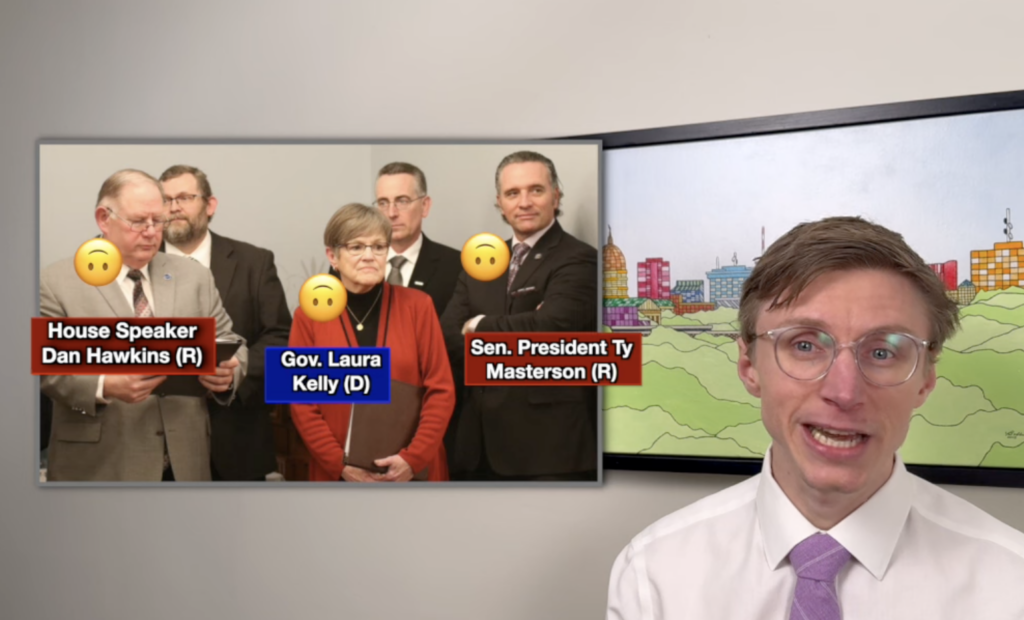Smoke Show: Hemp problems and downstream pollution from possible Farm Bill’s expiration
With the 2018 Farm Bill—a federal act that has allowed hemp distributors to sell unregulated marijuana to individuals with no age restrictions—set to expire in late September, hemp industry members are looking for ways to continue raking in profits from the currently unregulated products. Much has happened within Missouri’s hemp market since former Missouri Governor Mike Parson signed Executive Order 24-10 last year in an attempt to ban the sale of intoxicating hemp products in the state, so let’s recap what has happened since and where the industry currently remains.
At the time, he claimed that his executive order was driven to protect children from the intoxicating products, specifically pointing out that many of the products have misleading packaging that resembles popular candy brands like Mike and Ike and Airheads.
While the executive order was aimed to take effect the following month on Sept. 1, former Secretary of State Jay Ashcroft refused to sign off on the order, although several retailers distributing the hemp products were investigated by the Department of Health and Senior Services (DHSS).
On Sept. 17, general counsel for DHSS Richard Moore announced that the department would merely focus on embargoing and condemning products that violate trademark infringement.
Following the shift in the executive order, this past December, multiple leaders in the hemp industry filed separate bills that would regulate the market. These bills were supported by some large players, including the Missouri Beer Wholesalers Association, the Missouri Hemp Trade Association, and the Missouri Cannabis Trade Association (MoCannTrade), along with state representatives in favor of their respective sides.
The bills altered from party to party, with some aimed to ban THCA flower as a whole while continuing the sale of beverages containing intoxicating hemp, along with differing views on the amount of THC limited to the beverages and edibles, with some capping at 5 or 10mg THC and others at 100mg THC.
In the early months of this year, Jefferson City has been busy with hearings on the proposals, yet there still seems to be no solution on the horizon, with sides unable to find middle ground. Those in favor of the intoxicating hemp products claim that certain proposed regulations would create a “marijuana monopoly” for the licensed cannabis industry.
Late last month, St. Louis City Council and the city’s Board of Aldermen, led by Shane Cohn, took a stance on the subject, proposing a bill that would restrict the hemp market.
As disputes regarding the regulation of the hemp industry continue in Jefferson City, lobbyists among the unregulated market are attempting to shape how not only hemp is sold in the state, but regulated cannabis as well. Hemp business American Shaman is at the forefront of organizing an initiative petition that would repeal Amendment 3, which is the framework for legal recreational cannabis in Missouri.
The hope behind hemp leaders’ strategies here is for all marijuana products to be sold at age-gated retail locations authorized to sell the commodity. This would regulate the hemp market and, in turn, lessen some of the restrictions and guidelines that cover the legal cannabis market.
One aspect of the initiative that would change what Missourians know about the licensed cannabis industry would be the number of licenses granted to individuals. The constitution currently limits the number of licensed marijuana facilities, which would go out the window if the petition were to pass.
American Shaman lobbyist Eapen Thampy says that the text of the petition is yet to be finalized but he and other industry members are aiming to have the petition submitted to the Missouri Secretary of State this month, hopeful to gain enough signatures by next May for the language to materialize on the November 2026 ballot. The initiative has been organized by the political committee Missourians for a Single Market.
On top of the expiration of the 2018 Farm Bill, which raises concern among hemp activists, Missouri Attorney General Andrew Bailey recently sent cease-and-desist letters to several companies selling unregulated intoxicating hemp products throughout the state. But since Bailey never sent a notice of intent before announcing the notion, the letters seem to be more of a scare tactic. Nonetheless, the fact that legislators are consistently attempting to find a way to regulate or full-on ban intoxicating hemp is another reason for hemp supporters to work toward a regulatory framework.
Missouri Cannabis Trade Association Executive Director Andrew Mullins believes that this American Shaman-led initiative would be an ultimate failure for the currently regulated cannabis industry and the progress that has been made since medical and recreational sales became legal.
“Missouri’s licensed, regulated marijuana industry generated $241 million in state and local tax revenues last year alone and is roundly regarded as one of the most impactful in the entire country,” MoCannTrade Executive Director Andrew Mullins said in an email to The Pitch. “A ballot initiative to repeal Missouri’s twice-voter-approved cannabis legalization in any way would be a spectacular failure, especially since it’s funded by bad actors who are currently selling unregulated cannabis made overseas to Missouri children in gas stations and smoke shops.”
He and MoCann believe that the newly-found plan from hemp activists will go nowhere, stating that consumers are aware that the petition would profoundly affect what they know about legal cannabis in the state.
“Missourians aren’t about to take hundreds of millions away from local communities, veterans, and our justice system, all in hopes that politicians will eventually replace it with something down the road. The voters of the Show-Me State are far too smart for that bait and switch.”
As the coming months unfold, it will be key to see if Congress will pass an extension to the 2018 Farm Bill as they have done previously. If not, it would have an incredible impact on not only Missouri’s hemp market but it would disrupt the national hemp industry, which could possibly put traditional and ethical hemp farmers and distributors at risk.






